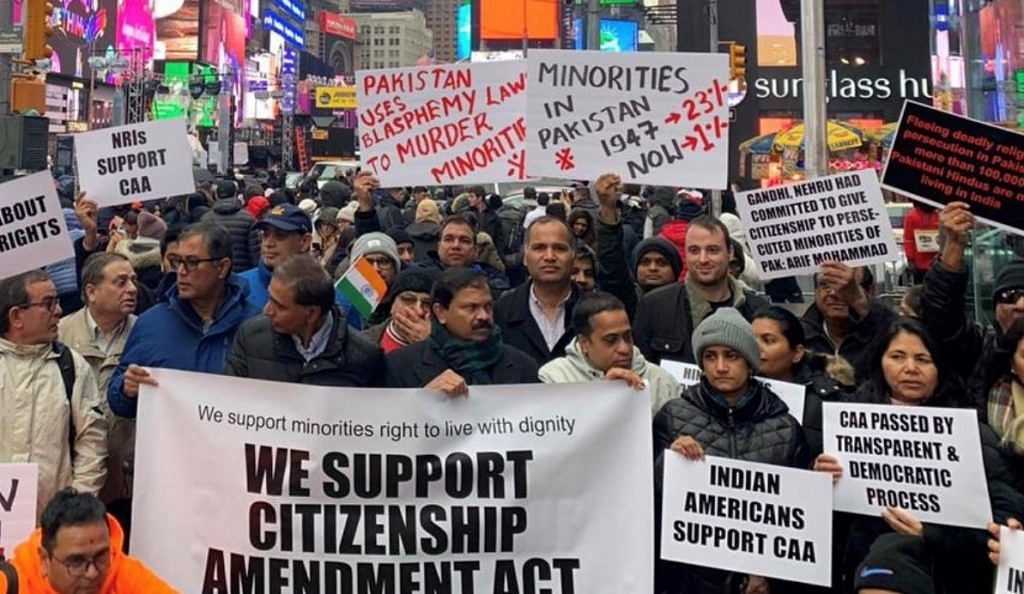On Christmas eve, I attended a gathering of mostly-Indian origin people outside the Indian consulate in San Francisco to protest the Citizenship (Amendment) Act. At some point during the protest, a man and a woman, also probably of Indian provenance, arrived and took their place across the street. Each held a poster in support of the CAA.
Like the anti-CAA protesters, they were exercising their right to democratic protest in the US. I could not help but wonder if they had any inkling of the several contradictions that their presence highlighted. Visible minorities in the US, by ethnicity and very probably by religion, perhaps not even US citizens, they were claiming and freely exercising the rights of free assembly, expression, and protest that belong to Americans. Yet, they were doing so in support of an Act that denies South Asian Muslims the same rights as Hindus, Sikhs, and members of other faiths in the region.
The placards they held carried banal statements like “I support CAA.” They stood in silence until the end of the protest, then melted away into the crowd of anti-CAA protesters. Many pro-CAA protests have seen thin attendance — a friend on Twitter noted that only one person turned up in Toronto — though it is likely that there are many NRIs who support the legislation but do not take to the streets.
The pro-CAA protesters in the US — the same ones that thronged Prime Minister Narendra Modi’s Houston event in September 2019 — are drawn from two overlapping groups. First, the aggressive Modi supporters from cities like Fremont and Sunnyvale in California that are populated with Indian immigrants who largely work in the technology sector. Second, an older community of Hindu NRIs across the US — from the Bay Area to New Jersey — whose cultural conservatism combined with experiences of social alienation and exclusion have led them to respond positively to the BJP’s outreach over the decades. The mobilisation occurs through a network of organisations that spans the Hindu Swayamsevak Sangh — the overseas arm of the Rashtriya Swayamsevak Sangh (RSS) — Hindu Students Council, community groups at local temples, and caste and regional groups in neighbourhoods, even corporations.
But beyond the contradictions displayed by the pro-CAA protester couple, conservative Hindu nationalist Indians and Indian-origin people in the US — who almost invariably are upper caste — embody other bizarre paradoxes too. In the US, they eagerly embrace affirmative action and initiatives related to diversity and inclusion that benefit them, but rant about reservations for Dalits and the supposed appeasement of Muslims in the Indian context. They support secularism in the American setting but sneer at the legacy of Nehruvian secularism in India. They defend a secular democracy in the US but bat for a Hindu Rashtra in India.
This kind of perspective, and its acute lack of self-awareness, is the product of an amalgamation of factors, some with deep historical roots. The messages on posters carried by the pro-CAA protesters at other gatherings in the US offer valuable insights into this weltanschauung.
Also read: How Rediff On The NeT first created a template for the Hindu Right online in the 1990s
Victimhood narrative, diasporic chauvinism
The most significant factor in what may be called diasporic Hindu majoritarianism is the idea of Hindus as a historically victimised community whose sufferings at the hands of Muslims have not been acknowledged. This narrative, which has been central to the rhetoric, politics, and cultural agenda of Hindu nationalist ideology since India’s Independence, constructs an imagined Hindu community, which has been the victim of a genocide and ‘Holocaust’ perpetrated by Muslims.
The narrative converges with the stereotype of the ‘Muslim terrorist’ and the post 9/11 suspicion of Islam as an inherently violent faith. These tropes can be found in Prime Minister Narendra Modi’s speeches as well as in the near-incomprehensible tweets of low-level BJP IT cell trolls. From this vantage point, any initiative, like the CAA, that denies Muslims certain rights while granting them to Hindus, Sikhs, and others, is both consistent with principles of justice and redressing a historic wrong.
The second major reason is simply that many immigrants from India, Hindu or otherwise, no matter how educated, seemingly liberal, cosmopolitan, or modern in their manner, have a deeply instrumental understanding of principles of human rights, minority rights, inclusion, and diversity. Western commitments to these ideas are simply mechanisms to be gamed toward securing a green card or US citizenship, in the same way that many Indians in the US are careful not to express discriminatory sentiments in public but will often make casteist, communal, or racist remarks in community gatherings. Such a cynical, dog-eat-dog, zero-sum approach views Hindus and Muslims as adversaries, the latter seen as disloyal to India and the logical inhabitants of Pakistan while India is deemed to be the obvious land of Hindus.
Diasporic chauvinism is not unique to Indians or to the global Hindu community. But combined with the history of sectarian conflict in India, the ascendancy of the Hindu Right, and the demonisation of Muslims in Modi’s India, it makes for a singularly toxic ideological brew.
As we know from great Marxist thinkers like Antonio Gramsci and Raymond Williams, it is the job of the ideology to conceal its contradictions. It is likely then that the Indian couple protesting on Arguello Boulevard in San Francisco on behalf of the CAA saw their support as innocent, straightforward, and consistent with Hindu rights. This too is part of the tragedy of Modi’s ‘new India.’
The author is an Associate Professor at Santa Clara University, California, US. Views are personal.
Also read: Once again, an IIT Kharagpur grad is bringing his regressive World Hindu Congress to US
